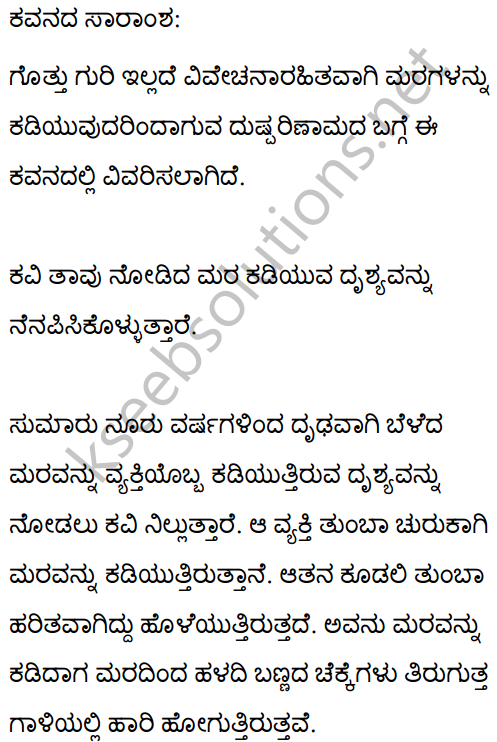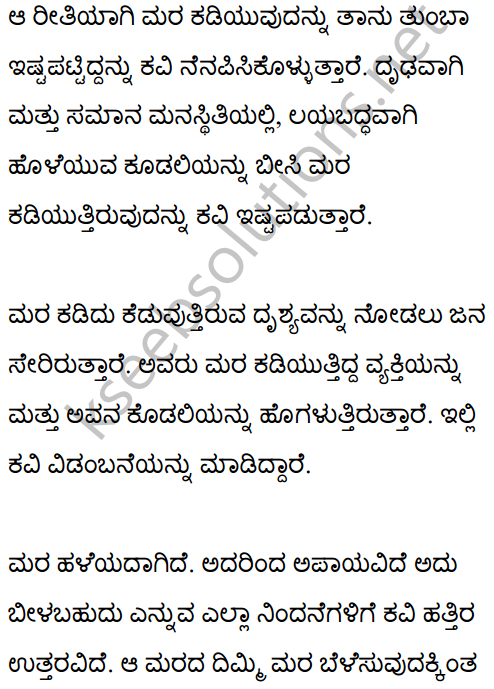KSEEB 8th English The Axe in the Wood Poem Notes Summary Questions and Answers
ILA. Your teacher will recite a poem for you. Listen to your teacher carefully and answer the questions given below.
Question 1.
Who does ‘I’ refer to in this poem?
Answer:
I refers to the tree.
Question 2.
How is the speaker a source of joy to children?
Answer:
The tree has many branches. They give company for the children to play. Like this, the speaker (tree) is a source of joy to children.
Question 3.
Name any two creatures that find comfort from the speaker.
Answer:
worms, birds
Question 4.
What do you think will happen to the speaker in the end?
Answer:
People cut the trees. The speaker (tree) dies in the end.
![]()
Textbook Questions and Answers
l. Answer the following questions and share your responses with your partner.
Question 1.
What words in stanzas 1 and 2 mean [a] 100 year [b] scene?
Answer:
(a) centuries
(b) sight.
Question 2.
Make a list of all the words that are used in the poem to describe the ‘axe’
Answer:
quick, sharp, glittering, bright are some of the words used in the poem to describe the ‘axe’.
Question 3.
Read the following words : trunk, axe, wood, timber, tree.
Which word does not fit in the above list?
Answer:
‘Axe’
II. Answer the following questions, picking up the most appropriate one from those given in brackets.
Question 1.
What did the man strike the tree with? [knife, axe, sickle, saw]
Answer:
axe,
Question 2.
Who were watching the sight of the man cutting the tree?
[women, people, woodcutters, children]
Answer:
people,
Question 3.
What did the tree look like?
[small, strong, weak, dry]
Answer:
strong.
![]()
Read and Write:
III. Read and discuss your responses with your partner. Then write.
Question 1.
Who do you think ‘I’ refers to in this poem?
Answer:
I refers to the poet.
Question 2.
Why do you think the poet stopped?
Answer:
The poet stopped of watch the scene of a man cutting a tree.
Question 3.
Which line tells us that the tree is aged?
Answer:
The line, “of a tree grown strong through many centuries” tells us that the tree is aged.
Question 4.
Does the poem mean that cutting a tree is a huge loss for human beings? Which line supports your answer?
Answer:
Yes, the poem means that cutting a tree is a huge loss for human beings. We can sup-port the answer by these lines, “Had more good in it than a growing tree, but I saw death cut down a thousand men”
Question 5.
Do you think the poet wrote this poem while the tree was being cut? Support your answer picking up the relevant line / lines from the poem.
Answer:
No, Poet did not write this poem while the tree was being cut “I stopped to watch a man strike at the trunk, “And I remember how I liked the sight”. These lines tell us that poet did not write the poem while the tree was being cut. He remembers the scene which he had watched of a man cutting a tree. He wrote it later.
Question 6.
Do you think the poet has made his intention clear to the reader at the end? Which lines support your answer?
Answer:
Yes, poet has made his intention clear to the reader at the end. Poet’s intention was to tell the effect of indiscriminate cutting of trees. The last line clears his intention to the reader. “But I saw death cut down a thousand man In that tall lovely legacy of wood”.
Question 7.
What message does the poem give us?
Answer:
The Poem gives the message of the harmful effects of indiscriminate cutting of trees. Cutting of one tree is equal to killing of thousands people. This means that one tree helps the survival the thousand of living beings, So we should not cut the trees.
![]()
Question 8.
What do you learn about the trees from this poem?
Answer:
Cutting of trees carelessly by man is a huge loss for human beings. So, we should not cut the trees, we have to grow and protect the trees.
Question 9.
‘But I saw death cut down a thousand men’ explain. What does the poet mean by ‘Lovely legacy of wood?’
Answer:
The poet had seen the scene of a man cutting a tree. The man was cutting one tree. But, poet had seen death cutting a thousand men. He saw the killing of men in each cut. One tree could help the survival of a thousand men.
“Lovely legacy of wood” means that some-thing handed down by predecessors or a gift left by will. Our predecessors had not cut that tree. They left it to as for our sur-vival. But we are cutting the trees carelessly.
Question 10.
A sonnet is a poem of fourteen lines. Usually a sonnet has a rhyme scheme. Is this poem a sonnet? Check whether this poem has a rhyme scheme or not.
Answer:
Yes, this poem is a sonnet but, this poem has no rhyme scheme.
Question 11.
Do you find any expressions of irony in this poem?
Answer:
Yes I find a expression of irony in this poem. Poet saw the scene of a man cutting a tree. He knows the ill effects of indiscriminate cutting of trees. Poet says that he liked the scene of cutting a tree. People gathered their to watch the man cutting tree. And they praised the man and his axe.
Poet liked the cutting of trees. People praised the man and his axe are really opposite in meanings to the fact that poet knows about the ill effects of indiscriminate cutting of trees.
IV. Death lays his icy hands on kings. The tree raised his hands to pray.
Question 1.
The above lines are instances of personification where human qualities are attributed to inanimate objects
like ‘death’ and ‘tree’. What is personified in the last stanza?
Answer:
“Death’ is personification in the last stanza.
Additional Questions with Answers
I. Choose the correct answer:
Question 1.
Poet had stopped to:
a. watch a man cutting a tree.
b. watch a man hunting a deer.
C. watch a man planting a seedling,
d. watch the people.
Answer:
b. watch a man hunting a deer.
![]()
Question 2.
Poet had liked:
a. The sight of cutting a tree
b. The man
c. The axe
d. The people
Answer:
a. The sight of cutting a tree
Question 3.
People gathered there to:
a. avoid cutting the tree.
b. plant the seedling.
c. take the timber.
d. watch the cutting of a tree.
Answer:
d. watch the cutting of a tree.
Question 4.
Cutting of the tree was praised by:
a. poet
b. people
c. a man
d. death
Answer:
a. poet
Question 5.
“But I saw death cut down a thousand men” the figure of speech mentioned in the line is
a. simile
b. personification
c. metaphor
d. irony
Answer:
b. personification
Question 6.
Which word does not fit in the following list:
a. trunk
b. axe
c. wood
d. timber
Answer:
b. axe
![]()
Question 7.
A poem that consists of fourteen lines is called:
a. lyric
b. sonnet
c. ballad
d. song
Answer:
b. sonnet
II. Read the following extracts and answer the following questions.
Question 1.
“I stopped to watch a man strike at the trunk”.
a. Who is T here?
Answer:
The poet is the T mentioned here.
b. Why did he stop?
Answer:
The stopped to watch a man cutting a tree.
c. Who was cutting a tree?
Answer:
A man was cutting a tree.
Question 2.
“And I remember how I liked the sight”
a. Who does ‘I’ refer?
Answer:
‘I’ refers to the poet.
b. What does the poet remember?
Answer:
The poet remembers the sight of a man cutting a tree.
c. What is the meaning of ‘sight’?
Answer:
Sight means ‘scene’ or ‘view’.
![]()
Question 3.
“But I saw death cut down a thousand men”.
a. Who is the ‘I’?
Answer:
The poet is the ‘I’ mentioned here.
b. Who cut down a thousand men?
Answer:
“Death” cut down a thousand men.
c. Name the figure of speech mentioned in the line.
Answer:
Personification.
The Axe in the Wood Poem Summary in English
The poem is about the harmful effects of poaching, and indiscriminate cutting of trees.
Poet stopped to watch the scene of a man cutting a centuries old strong tree. The axe was very sharp and glittering. The man was very quick in cutting deep into the tree. The yellow chips of the tree went spinning in the air when he had cut the tree.
The poet remembers the scene of cutting trees. He liked to watch the sight which had a prose and rhythm as the bright axe swung. People had gathered there, to watch the tree being cut. They praised the man and his axe. Poet makes an irony here.
Poet knows the answer to the possible blame. The tree is very old and it is dangerous. It might fall. So the tree should be cut and the timber used.
Cutting the tree and its timber is not better than a growing tree. Poet sees death cut down a thousand men, in that tall lovely legacy of wood. Cutting of a tree is a huge loss for human beings.
![]()
The Axe in the Wood Poem Summary in Kannada



![]()
The Axe in the Wood Poem Word in English
- strike = deliver or inflict a blow on
- trunk = The main stem of a tree as distinct from its branches
- glittering = shining
- spin = turn or cause [a person or thing] to turn round
- sight = view, scene
- poise = stable and balanced state
- swing = move or cause to move with a curving motion
- glory = fame, praise
- reproach = blame
- timber = wood prepared for use in building, carpentry etc :
- stack = a pile or heap
- legacy = something handed down by predecessors, a gift left by will
- wood tree = did
- chance = casual
- to crowd upon = to favour, to eulogize
- rhythm = movement with a regular succession of beats
- chance reproach = a possible blame
- eulogize = to praise very highly